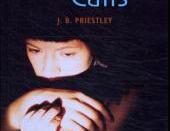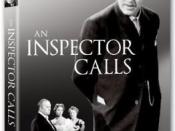In the play 'An Inspector Calls' by J B Priestley one of the integral characters is Sheila Birling. The daughter of Sybil and Arthur.
The play is set in 1912 in the family home of the wealthy Mr Arthur Birling. When the play begins the family are celebrating the engagement of Sheila to Gerald Croft who is also present. After dinner the women Sybil and Sheila leave and Arthur is telling Gerald and his son Eric; "that a man has to mind his own business and look after himself and his own" When an Inspector Goole who is an enigma arrives, apparently to investigate the death of a young woman called Eva Smith, it is discovered that Arthur fired her from his factory after a strike two years previously. When she finally gets another job in Milwards Sheila is jealous of Eva because she looks better in address so Sheila complains to the manager and gets her fired from her last real job.
Eva became desperate and goes to the palace bar, calling herself Daisy Renton where Gerald picks her up. He puts her up in his friend's rooms, which leads to her becoming his mistress. After Gerald ends their affair she goes to the seaside until her money runs out. She is forced to return to the palace bar where she meets Eric. After spending some time with Eric she becomes pregnant, so he gives her some money. When Eva discovers the money is stolen she refuses to take anymore. With no options left to her she goes to the Brumley Woman's Charity Organization calling herself Mrs Birling. This angered Sybil and caused her to refuse the plea. This final blow led Eva to kill herself by drinking disinfectant.
Before the Inspector arrives Sheila is complacent and vain; "Oh-it's wonderful! Look-Mummy-isn't it a beauty?" She thinks a lot about the way things look and expects people to give her beautiful things, as she has never known life any other way.
Sheila is also very snobbish saying things like; "Chump! I can't drink to this, can I?" The language she uses shows that she is snobbish and reveals her whole attitude to life.
When Sheila witnesses her father's questioning by the Inspector she is extremely shocked by the reality of the girl's death and the way her father runs his business; "I think it was a mean thing to do. Perhaps that spoilt everything for her." She reveals her feelings of horror towards her father's attitude; "But these girls aren't cheap labour-they're people" All these strong feelings come from the realisation about the way people treat each other which are directed ironically at her father, the man who has sheltered her from the world her whole life.
While being questioned be the Inspector the most obvious reaction Sheila has is guilt; "â¦I felt rotten about it at the time and now I feel a lot worse." She cooperates fully with the Inspector, describing what she has done; "I went to the manager at Milwards and I told him that if they didn't get rid of that girl, I'd never go near the place again and I'd persuade mother to close our account with them." She forced the shop to fire Eva for no good reason but does at least tell the Inspector without trying to pretend it didn't matter. She also tries to explain why she felt justified in her actions at that time in her angered state; "If she'd been some miserable plain little creature, I don't suppose I'd have don't it. But she was very pretty and looked as if she could take care of herself." Her jealousy and lack of comprehension of what life was like for working class people is what made her think there would be no consequences of her actions.
After the Inspector has gone Sheila continued to carry her feelings of guilt; "And don't let's start dodging and pretending now. Between us we drove that girl to commit suicide." This shows it is what they have done, not the trouble they may or may not be in now which is important to Sheila.
Sheila is also a lot stronger and more wilful at the end of the play, which is chiefly shown, in her attitude to Gerald; "I suppose you're going to prove now you didn't spend last summer keeping this girl." She has the confidence to say and do things that never would have occurred to her before. The new knowledge she has gained has become a source of strength as well as the cause of great guilt, which she must now learn to live with.
I think Sheila will change substantially as a result of the Inspector's visit. She will now become a more responsible and caring person in the future possibly becoming part of a fairer charity than that of her mother.
My opinion of Sheila is that she has a very promising future now that she has changed her ways. She may now become a member of a prominent group fighting for the social change she has come to realise is so important. I think the play as a whole was very interesting to read and was extremely thought provoking due to the mysterious ending. I very much agree with the message of the play of social inclusion and the importance of community.
The play is still relevant today because too many, people still take heed of the words of men like Arthur Birling; "A man has to make his own way-has to look after himself-and his family too of courseâ¦" This causes much social ostracization in working class communities meaning there are still young men and women like Eva Smith killing themselves in the big towns and cities all over the world.





